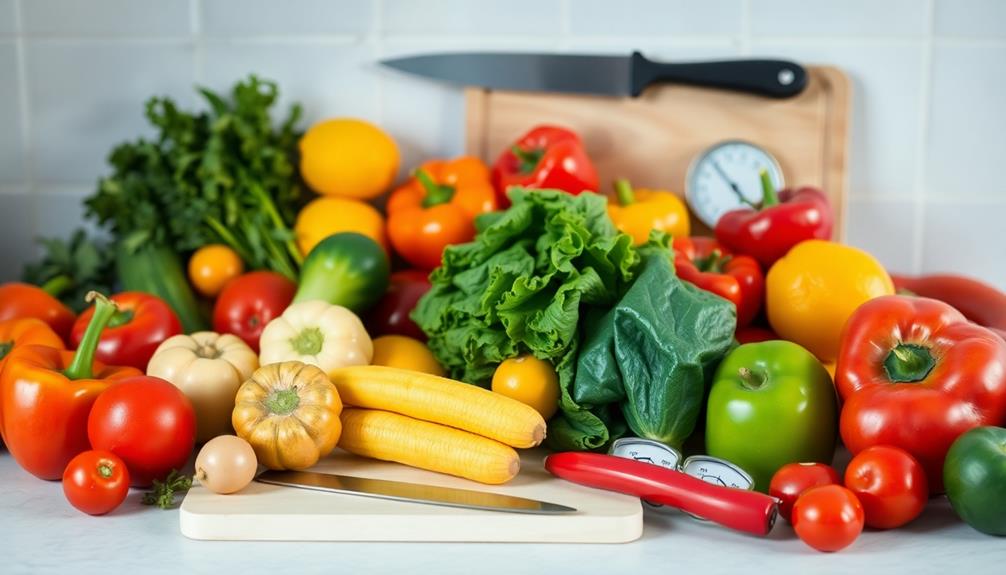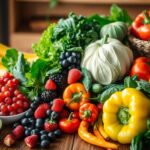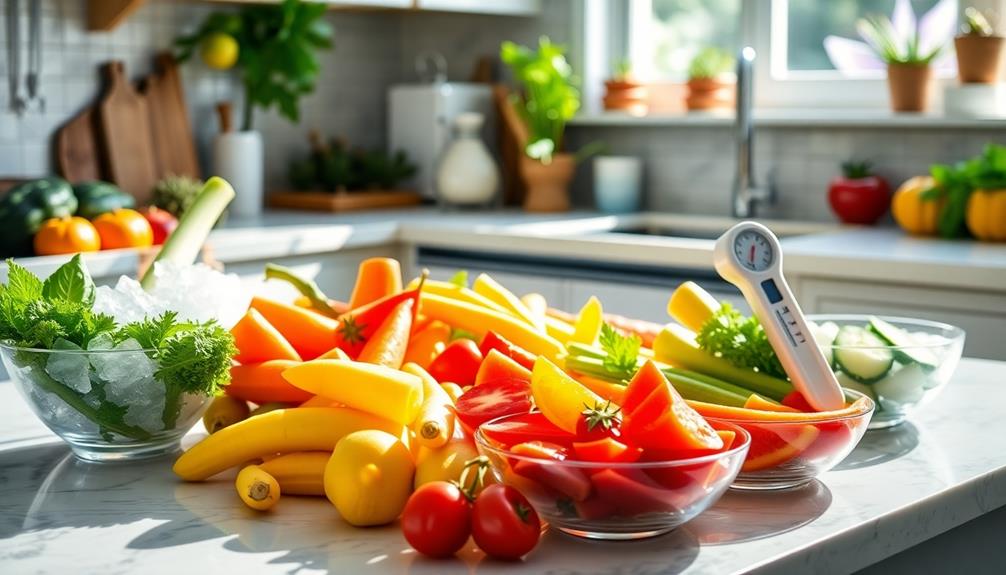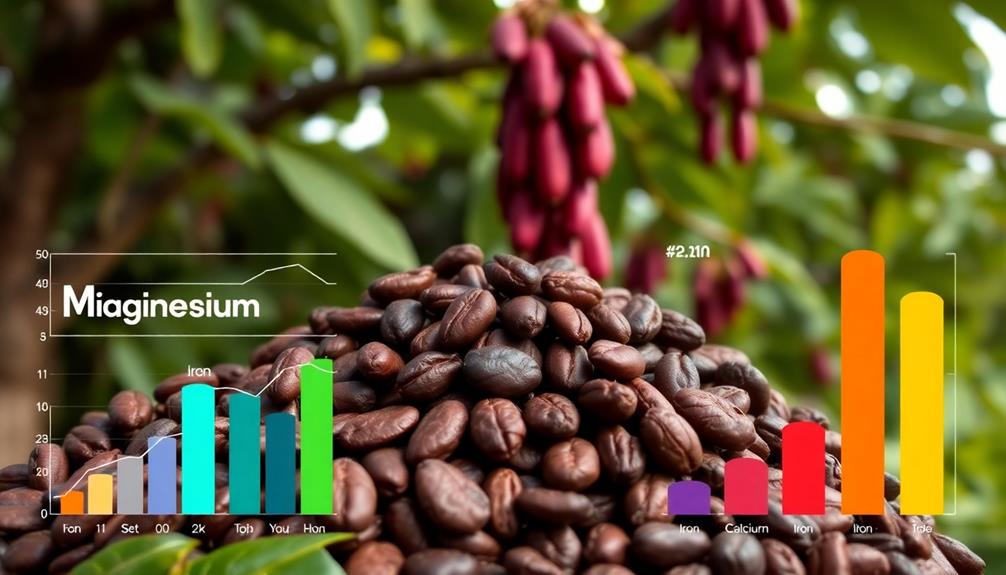Raw food safety is vital for you as an immunocompromised individual. You're at a much higher risk of severe foodborne illnesses, so avoiding raw meats, seafood, eggs, and unpasteurized dairy is essential. Always verify thorough cooking of meats and eggs to eliminate harmful pathogens. Wash fresh produce well before consumption, and be cautious with sprouts. Stick to pasteurized dairy products to minimize risks. Following these guidelines will help protect your health and enhance your well-being. If you're curious about more specific practices and tips for your diet, there's plenty more valuable information available.
Key Takeaways
- Immunocompromised individuals should avoid raw foods like meats, seafood, eggs, and unpasteurized dairy due to heightened risk of foodborne illnesses.
- Always cook meats to at least 165°F (74°C) and ensure eggs are firm to eliminate harmful pathogens.
- Prioritize pasteurized dairy products and avoid soft cheeses made from unpasteurized milk to reduce Listeria exposure.
- Practice strict food safety measures, such as washing hands, using separate cutting boards, and rinsing produce thoroughly to prevent contamination.
- Consult healthcare providers for tailored dietary advice and stay updated on food safety practices to protect health.
Importance of Food Safety
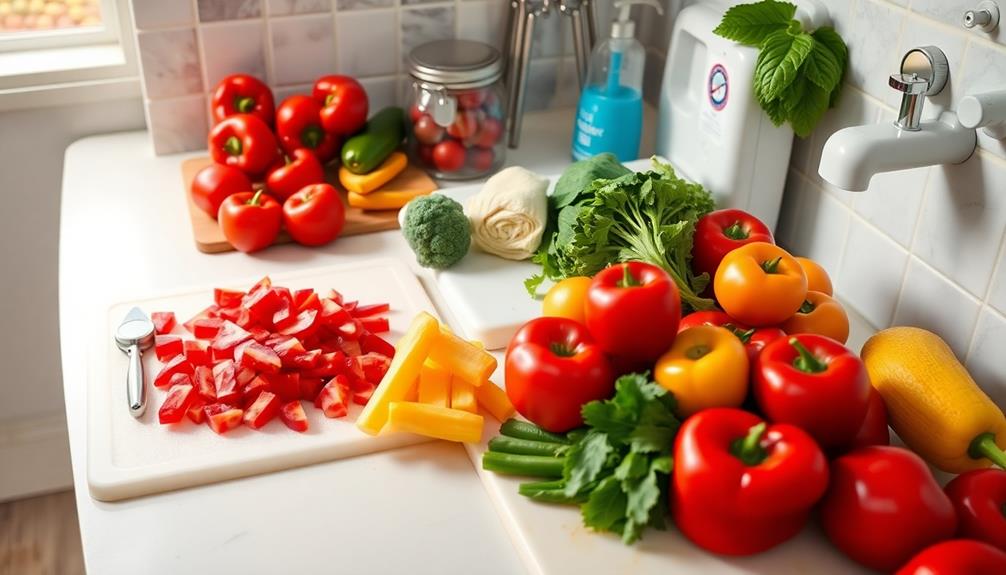
When it comes to your health, food safety isn't just a guideline—it's a necessity, especially for immunocompromised individuals. Your immune system can't effectively fight off infections, making you particularly vulnerable to foodborne illness. Pathogens like Salmonella, Listeria, and E. coli pose serious threats, often leading to severe complications. That's why adhering to strict food safety guidelines is essential.
Individuals undergoing treatment for conditions like late-stage breast cancer may have heightened risks, making safe food preparation even more imperative.
Handling food properly can greatly reduce your risk of contamination. This means avoiding raw or undercooked foods, as well as ensuring that your meals reach the appropriate cooking temperatures. Safe food handling practices, such as thoroughly washing produce and correctly refrigerating perishables, play a crucial role in keeping you healthy.
It's important to stay informed about food safety to protect your well-being. Continuous education on best practices and tailored dietary advice can equip you with the knowledge needed during meal preparation and consumption.
Food Safety Guidelines
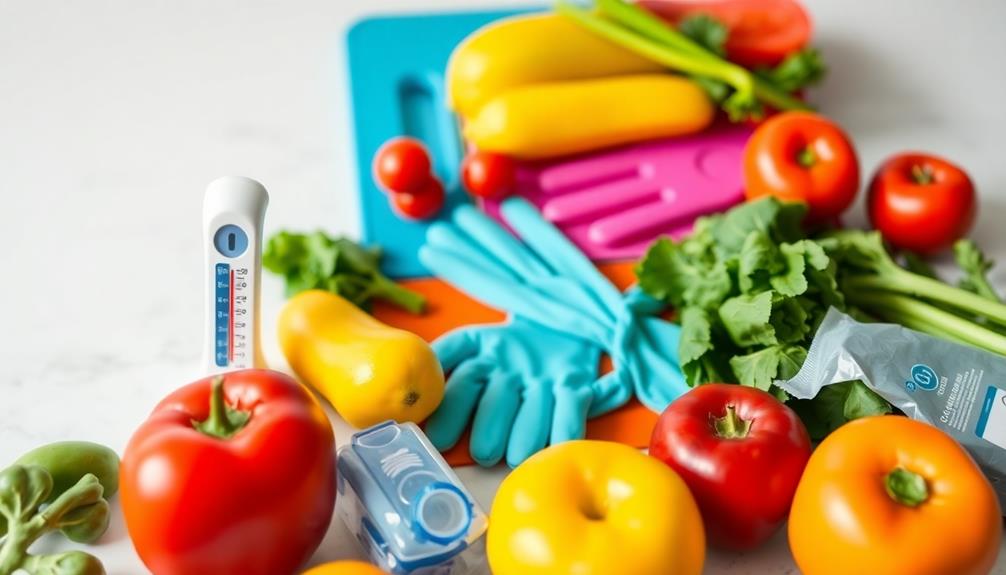
When you're immunocompromised, understanding food safety guidelines is essential to protect your health.
You'll want to avoid raw foods that can harbor harmful bacteria, and make sure you cook items like meat and eggs thoroughly.
Additionally, stick to pasteurized dairy options to further minimize your risk of foodborne illnesses.
Risks of Raw Foods
Raw foods can pose serious health risks, especially for immunocompromised individuals. Consuming raw meat, seafood, or eggs can expose you to dangerous foodborne pathogens like Salmonella and E. coli. These bacteria can lead to severe illness, making it vital for you to be aware of the potential dangers. Unpasteurized dairy products, such as soft cheeses made from raw milk, also carry harmful bacteria like Listeria, which can greatly increase your infection risk.
To help you understand the risks, consider the following table:
| Raw Food Type | Associated Risks |
|---|---|
| Raw meat | Salmonella, E. coli, food poisoning |
| Raw seafood | Vibrio, parasites, food poisoning |
| Raw eggs | Salmonella, severe gastrointestinal illness |
| Unpasteurized dairy | Listeria, increased infection risk |
| Fresh produce | E. coli, Salmonella from contaminated sources |
The Centers for Disease Control and Prevention (CDC) recommends avoiding these raw foods to minimize exposure to foodborne pathogens. Proper cooking and pasteurization are essential practices that can help reduce the risk of food poisoning and safeguard your immune systems.
Safe Cooking Techniques
Ensuring the safety of your food is essential, especially for immunocompromised individuals. One of the best ways to do this is by employing safe cooking techniques. Always cook meats thoroughly, aiming for an internal temperature of at least 165°F (74°C) to kill harmful bacteria. This is especially vital for poultry and ground meats.
When cooking eggs, make sure both the white and yolk are firm to reduce the risk of Salmonella.
To prevent cross-contamination, use separate cutting boards for raw meats and ready-to-eat foods. After each use, wash them with hot, soapy water. You should also wash your hands frequently while preparing food to help protect yourself from potential contaminants.
When it comes to fresh fruits and vegetables, rinse them under running water before consumption, and consider peeling them when appropriate.
Additionally, use safe cooking techniques like boiling or steaming vegetables. These methods not only kill potential pathogens but also preserve their nutritional value.
Pasteurized Dairy Options
Safe cooking techniques are just one part of maintaining food safety for immunocompromised individuals; choosing the right dairy products is equally important. You should only consume pasteurized dairy options to minimize the risk of harmful bacteria like Listeria, which can thrive in raw milk.
Soft cheeses such as Brie, Camembert, and feta are particularly risky unless they're labeled as pasteurized, as they're more likely to contain foodborne pathogens.
When shopping, focus on pasteurized options like milk, yogurt, and hard cheeses, which are safer for your weakened immune system. Always check the labels to verify the dairy products you choose are pasteurized.
Many unpasteurized dairy items can harbor dangerous bacteria, and for immunocompromised people, the consequences of consuming these can be severe.
Risks of Raw Foods

The dangers of consuming raw foods can be especially pronounced for immunocompromised individuals. Your weakened immune system makes you more susceptible to harmful organisms that thrive in uncooked foods.
Here are some key risks to take into account:
- Pathogens: Raw meats, seafood, and eggs can harbor dangerous bacteria like Salmonella and E. coli, leading to severe illnesses.
- Unpasteurized Dairy: Soft cheeses made from raw milk are particularly risky, often containing Listeria and other harmful bacteria.
- Fresh Produce: Raw sprouts and other vegetables can be contaminated with bacteria, heightening the risk of foodborne illness.
- Neutropenic Diet Recommendations: Following a neutropenic diet usually means avoiding raw foods altogether to minimize exposure to potential pathogens.
For immunocompromised individuals, the consumption of raw or undercooked foods can lead to serious complications.
It's essential to understand these risks and prioritize food safety to protect your health. Always opt for well-cooked options and consult your healthcare provider for tailored dietary advice.
Your immune health depends on it!
Safe Produce Handling

Handling produce properly is vital for minimizing health risks, especially for immunocompromised individuals. To guarantee the safe consumption of fresh fruits and vegetables, always wash them thoroughly under running water before eating. This step helps remove potential contaminants and pathogens that can pose serious health risks.
For fruits and vegetables that are difficult to wash completely, peeling them can further reduce the chances of contamination.
Be cautious with raw sprouts, such as alfalfa or bean sprouts. These can harbor harmful bacteria like Salmonella and E. coli, making them unsafe for your diet. If you want to lower the risk of bacteria, consider cooking your vegetables, as heat effectively kills many pathogens.
Additionally, always store fresh produce in the refrigerator. This practice slows down spoilage and prevents the growth of harmful bacteria that can thrive at room temperature.
By following these simple yet essential steps for safe produce handling, you can greatly reduce your risk of foodborne illnesses and enjoy the nutritional benefits of fresh fruits and vegetables without compromising your health.
Dairy and Cheese Precautions

When it comes to dairy and cheese, being vigilant is essential for your health if you're immunocompromised. Many dairy products can harbor harmful bacteria, so here's what you need to keep in mind:
- Choose Pasteurized Options: Always select pasteurized dairy products. Pasteurization eliminates dangerous pathogens while keeping nutritional benefits intact.
- Avoid Soft Cheeses: Stay away from soft cheeses made from unpasteurized milk, like Brie and feta. These can contain Listeria, which poses a serious risk.
- Skip Raw Dairy Products: Unpasteurized milk and yogurt aren't safe for you. They can lead to severe foodborne illnesses that your weakened immune system may struggle to fight.
- Check Labels: When buying cheese, read the labels carefully. Many soft cheeses are available in pasteurized forms, so verify you're selecting a safe option.
Individualized Dietary Guidance

When it comes to your nutrition, individualized dietary guidance is essential for your safety and health.
Consulting with healthcare providers can help you get tailored food safety guidelines that fit your unique needs.
Personalized recommendations guarantee you make informed choices while minimizing the risk of foodborne illnesses.
Personalized Nutrition Recommendations
For immunocompromised individuals, personalized nutrition recommendations play an important role in maintaining health and preventing foodborne illnesses. Tailoring your diet can greatly reduce your risk while guaranteeing you receive adequate nutrition.
Here are four key aspects to reflect on:
1. Choose Safe Foods: Prioritize safe internal cooking temperatures for meats and opt for pasteurized dairy products to minimize exposure to harmful bacteria.
Additionally, think about incorporating high-quality protein sources to support overall health while avoiding potential allergens.
2. Balanced Diet: Incorporate a variety of foods to guarantee you're getting all necessary nutrients while maintaining a balanced diet that supports your immune system.
3. Regular Monitoring: Keep track of your nutritional intake and any dietary restrictions. This can help you maintain balanced nutrition while adhering to food safety protocols.
4. Educate Yourself: Stay informed about food safety practices. Understanding safe food handling, cooking, and storage is vital to preventing infections.
Consultation With Healthcare Providers
Consulting with healthcare providers can make a significant difference in managing your diet as an immunocompromised individual. By seeking personalized dietary guidance, you can receive recommendations tailored to your specific health conditions and treatment plans. These professionals understand the importance of food safety and can help you minimize the risk of foodborne infections while meeting your nutritional needs.
Here's a quick overview of the benefits of consultations:
| Benefit | Description | Emotional Impact |
|---|---|---|
| Personalized Guidance | Tailored dietary advice based on individual needs | Empowerment in your choices |
| Reduced Risk of Infections | Strategies to avoid foodborne illnesses | Peace of mind |
| Ongoing Education | Continuous updates on food safety protocols | Confidence in your diet |
Your consultation with healthcare providers is essential in maneuvering the complexities of your diet. Keep in mind, dietary advice can vary across different cancer centers, highlighting the importance of individualized consultations. Accessing resources, like fact sheets from organizations such as The Leukemia & Lymphoma Society, can further enhance your understanding of safe food practices.
Tailored Food Safety Guidelines
Tailored food safety guidelines are essential for immunocompromised individuals who need to navigate their dietary choices carefully. Since your immune system is weakened, it's important to avoid foods that could pose a risk of foodborne illnesses, particularly those that are raw or undercooked.
Here are a few key points to keep in mind:
- Avoid raw eggs: They can harbor harmful bacteria like Salmonella, which is especially dangerous for you.
- Consult your healthcare provider: Get personalized dietary instructions that consider your specific health needs.
- Stay updated: Regularly check for the latest food safety guidelines from trusted organizations. Recommendations may vary between cancer centers.
- Utilize credible resources: Organizations like The Leukemia & Lymphoma Society provide valuable dietary advice and safe food handling practices tailored for immunocompromised patients.
Continuous education about food safety is important. By making informed choices, you can greatly reduce the risk of infection related to food consumption.
Always prioritize your health and the safety of the foods you choose.
Continuous Education and Resources

Regularly updating your knowledge about food safety is essential for immunocompromised individuals. Continuous education helps you stay informed about the risks associated with consuming raw foods, including raw eggs, and how to avoid potential health hazards.
Understanding the potential side effects and interactions of cold medications can also be beneficial, especially if you're managing symptoms while undergoing treatment. Resources like common cold medications such as decongestants and antihistamines can provide additional support in maintaining overall health.
Participating in workshops and training programs can deepen your understanding of food safety practices and specific risks. These sessions benefit both you and food handlers, promoting safer food preparation techniques.
Additionally, subscribing to official food safety alerts from organizations like the FDA keeps you updated on recalls and safety advisories, which is fundamental in protecting your health.
Collaboration among healthcare providers, nutritionists, and food safety experts is essential in creating thorough educational materials. This way, you receive tailored information that meets your unique needs as an immunocompromised individual.
Frequently Asked Questions
Can You Eat Sushi if You Are Immunocompromised?
If you're immunocompromised, it's best to avoid sushi made with raw fish. Instead, opt for fully cooked seafood or vegetable rolls. These alternatives let you enjoy sushi while minimizing the risk of foodborne illnesses.
What Are the Precautions for Immunocompromised Patients?
So, you think living on the edge with food's a thrill? Well, if you're immunocompromised, skip the risks. Stick to cooked foods, wash fruits, avoid raw sprouts, and keep your kitchen a bacteria-free zone.
What to Avoid if You Are Immunocompromised?
If you're immunocompromised, avoid raw or undercooked meats, eggs, and seafood. Stay clear of unpasteurized dairy, soft cheeses, and raw sprouts. Always wash fruits and vegetables thoroughly to reduce the risk of contamination.
Why Is Food Safety Important for Immunocompromised Patients?
Food safety's essential for you because it helps prevent foodborne illnesses that can lead to severe complications. By practicing safe food handling, you reduce your risk and protect your health during vulnerable times.
Conclusion
So, if you're immunocompromised and feeling adventurous, why not toss caution to the wind and plunge into that raw meat smoothie? Just kidding! Prioritizing food safety is essential for your health. Remember, it's not just about avoiding a sniffle; it's about keeping your immune system in tip-top shape. So, stick to those safety guidelines, wash your produce, and steer clear of questionable dairy. Your body will thank you for it, and you'll keep those adventurous smoothies for another day!

